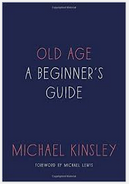It’s perhaps an odd way to put it, but thought-provoking: old age comes for us all, if we are lucky enough to live that long. Disarming the sore points with humor while engaging in a deeply honest contemplation of the future that awaits us is the modus operandi of Michael Kinsley’s slim volume of essays. Michael Kinsley (b. 1951), one of the Baby Boomers’ most prolific and insightful journalists, was diagnosed with Parkinson’s at the age of 43, so has had an early glimpse into what the degenerative aspects (physical and mental) of aging will be like. In this breezy, mordant collection of essays he gives us a preview.
The front end of the Baby Boom generation, those born between, say, 1945 and 1954, is now slouching in the direction of old age: the oldest boomers have turned 70. In a neat chiasmus, of the markers of success Kinsley identifies (making money, making more money, making more money faster), getting to the finish line of life first is not necessarily the goal. That’s tough to take for a generation raised to succeed. In Kinsley’s description, the Baby Boomers succeeded the greatest generation; succeeded in forcing the US out of Vietnam; succeeded at squandering the resources, financial and environmental, our parents left to us. We’re a bit obnoxious – Kinsley claims that we’re so obnoxious that we scored only two Presidents, Bill Clinton and George W. Bush. (Kinsley wrote his essays before the final candidates emerged from this year’s messy nominating process. Both apparent nominees, Hillary Clinton, b. 1947, and Donald Trump, b. 1946, are Boomers. Bernie Sanders, b. 1941, is not.)
A couple of themes emerge. One is, well, the meaning of life. Is it to accomplish something? Most of us, Kinsley points out, even those who wrote a lot or made a lot of money, won’t be remembered, outside our families, for long after our deaths. Accumulate things? Kinsley sums up that option with a discussion of the bumper sticker “He who dies with the most toys, wins.” Live longer? As Kinsley points out, and his experience underlines, there’s a point at which quality of life starts to decline. So what is the meaning? He gets to that, but enjoy the voyage, because Kinsley’s commentary is wildly entertaining, and well-written.
Another theme is coping. Kinsley outlines three strategies–denial, confrontation, or acceptance–for the moment disease comes into one’s life (and it will, is Kinsley’s reminder).
Acceptance is an aspiration, not a strategy. Confrontation means putting the disease at the center of your life. . .Denial, on the other hand, means letting the disease affect your day-to-day life as little as possible. In fact, it means pretending as best you can that you don’t even have it.
To me, confrontation and denial seem like equally valid strategies, and the choice between them is one of personal taste.
Parkinson’s disease itself provides Kinsley with a third theme, others who’ve had it (Michael J. Fox, Pope John Paul II, possibly Hitler), research, particularly the way the second Bush Administration sat on stem cell research, and whether it kills you (many people with Parkinson’s die of something else). His description of what must have been a very frightening surgery, deep brain stimulation (DBS), is quite funny.
I tried to convince myself in the days leading up to the operation that DBS isn’t really brain surgery. They don’t crack open your skill; they just drill a couple of small holes to put the wires through. Tiny holes. Itsy-bitsy holes . . . [the paperwork] describes the holes as ‘dime-sized.’ That took me aback. The dime, there’s no denying, is a seriously undersized coin. But frankly, I hadn’t been thinking of coins at all. I’d been thinking grains of sand. A dime is huge!
There are no answers, though there are some very funny set pieces and some serious observations along the way. Kinsley ends his book with a look to the future: that Boomers, together, set an example and mend our ways. Americans have been unrealistic for quite some time, he notes, in our refusal to pay now for anything. But without money, our government won’t continue functioning, and Kinsley runs through arguments about infrastructure and the estate tax and increasing and inefficient health care spending. Something has to give, and he challenges his generation to suggest a solution.
Have a book you want me to know about? Email me at asbowie@gmail.com. Follow me on Twitter @abowie917.



